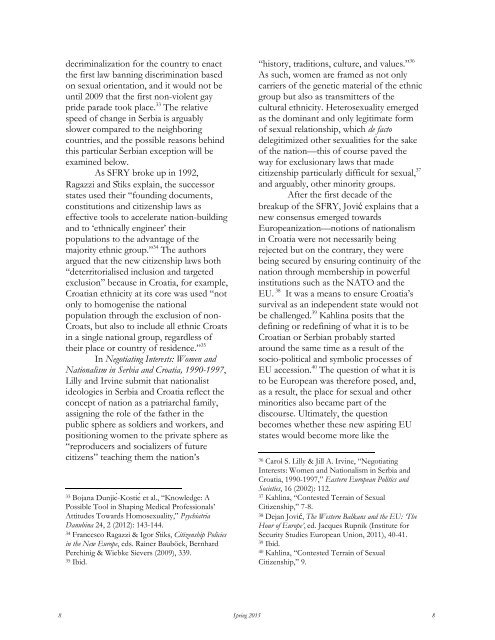JPI Spring 2015
You also want an ePaper? Increase the reach of your titles
YUMPU automatically turns print PDFs into web optimized ePapers that Google loves.
decriminalization for the country to enact<br />
the first law banning discrimination based<br />
on sexual orientation, and it would not be<br />
until 2009 that the first non-violent gay<br />
pride parade took place. 33 The relative<br />
speed of change in Serbia is arguably<br />
slower compared to the neighboring<br />
countries, and the possible reasons behind<br />
this particular Serbian exception will be<br />
examined below.<br />
As SFRY broke up in 1992,<br />
Ragazzi and Sťiks explain, the successor<br />
states used their “founding documents,<br />
constitutions and citizenship laws as<br />
effective tools to accelerate nation-building<br />
and to ‘ethnically engineer’ their<br />
populations to the advantage of the<br />
majority ethnic group.” 34 The authors<br />
argued that the new citizenship laws both<br />
“deterritorialised inclusion and targeted<br />
exclusion” because in Croatia, for example,<br />
Croatian ethnicity at its core was used “not<br />
only to homogenise the national<br />
population through the exclusion of non-<br />
Croats, but also to include all ethnic Croats<br />
in a single national group, regardless of<br />
their place or country of residence.” 35<br />
In Negotiating Interests: Women and<br />
Nationalism in Serbia and Croatia, 1990-1997,<br />
Lilly and Irvine submit that nationalist<br />
ideologies in Serbia and Croatia reflect the<br />
concept of nation as a patriarchal family,<br />
assigning the role of the father in the<br />
public sphere as soldiers and workers, and<br />
positioning women to the private sphere as<br />
“reproducers and socializers of future<br />
citizens” teaching them the nation’s<br />
33 Bojana Dunjić-Kostić et al., “Knowledge: A<br />
Possible Tool in Shaping Medical Professionals’<br />
Attitudes Towards Homosexuality,” Psychiatria<br />
Danubina 24, 2 (2012): 143-144.<br />
34 Francesco Ragazzi & Igor Štiks, Citizenship Policies<br />
in the New Europe, eds. Rainer Bauböck, Bernhard<br />
Perchinig & Wiebke Sievers (2009), 339.<br />
35 Ibid.<br />
“history, traditions, culture, and values.” 36<br />
As such, women are framed as not only<br />
carriers of the genetic material of the ethnic<br />
group but also as transmitters of the<br />
cultural ethnicity. Heterosexuality emerged<br />
as the dominant and only legitimate form<br />
of sexual relationship, which de facto<br />
delegitimized other sexualities for the sake<br />
of the nation—this of course paved the<br />
way for exclusionary laws that made<br />
citizenship particularly difficult for sexual, 37<br />
and arguably, other minority groups.<br />
After the first decade of the<br />
breakup of the SFRY, Jović explains that a<br />
new consensus emerged towards<br />
Europeanization—notions of nationalism<br />
in Croatia were not necessarily being<br />
rejected but on the contrary, they were<br />
being secured by ensuring continuity of the<br />
nation through membership in powerful<br />
institutions such as the NATO and the<br />
EU. 38 It was a means to ensure Croatia’s<br />
survival as an independent state would not<br />
be challenged. 39 Kahlina posits that the<br />
defining or redefining of what it is to be<br />
Croatian or Serbian probably started<br />
around the same time as a result of the<br />
socio-political and symbolic processes of<br />
EU accession. 40 The question of what it is<br />
to be European was therefore posed, and,<br />
as a result, the place for sexual and other<br />
minorities also became part of the<br />
discourse. Ultimately, the question<br />
becomes whether these new aspiring EU<br />
states would become more like the<br />
36 Carol S. Lilly & Jill A. Irvine, “Negotiating<br />
Interests: Women and Nationalism in Serbia and<br />
Croatia, 1990-1997,” Eastern European Politics and<br />
Societies, 16 (2002): 112.<br />
37 Kahlina, “Contested Terrain of Sexual<br />
Citizenship,” 7-8.<br />
38 Dejan Jović, The Western Balkans and the EU: ‘The<br />
Hour of Europe’, ed. Jacques Rupnik (Institute for<br />
Security Studies European Union, 2011), 40-41.<br />
39 Ibid.<br />
40 Kahlina, “Contested Terrain of Sexual<br />
Citizenship,” 9.<br />
8 <strong>Spring</strong> <strong>2015</strong> 8
















